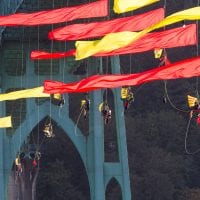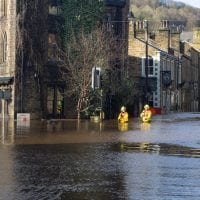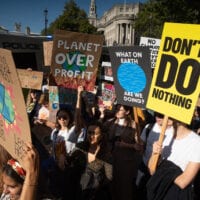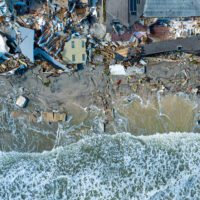The effects of climate change include extreme heat and drought, more rainfall and more frequent extreme weather events such as storms and floods.
Melting polar ice and glaciers is leading to sea-level rise around the world, which – along with increased storm surges – is starting to permanently re-shape coastlines.
Around the world, climate change already has (or will soon have) impacts on every aspect of human life. Wildfires and extreme temperatures are already impacting people’s health. Drought and less fresh water mean it’s harder to grow food.
What are the impacts of climate change on people?
The impacts of heatwaves, wildfires, droughts, storms, floods and sea-level rise is already devastating for many communities around the world.
Impacts are predicted to become catastrophic if governments cannot bring greenhouse gas emissions and global temperature rises under control.
Extreme weather around the world is destroying homes and lives
In the Pacific island nations, Central America, the Caribbean and southern US states such as Louisiana and Florida, hurricanes are increasingly severe and far more frequent, leading to loss of life, homes, harvests or entire farms.
In South and Southeast Asia, countries like Bangladesh, Myanmar and the Philippines face more and stronger cyclones or typhoons – which can destroy entire regions. It takes years to rebuild.
Climate change is causing more extreme weather in the UK such as heatwaves and storms. Increased heat in the atmosphere leads to more heavy rainfall and more frequent flooding, often impacting the same areas over and over again.
Extreme weather events are devastating to any community. But those in poorer nations, and people living in underprivileged communities in rich nations, also struggle to recover.
Sea level rise threatens entire nations and communities
Sea level rises are already affecting Pacific island nations like Kiribati and the Marshall Islands.
Native Americans in Alaska and Louisiana are facing not only a rapid reshaping of their ancestral coastlines, but also the effects of polluting oil and gas drilling.
Indigenous Peoples worldwide suffer disproportionately from both the causes and effects of climate change. This is despite their deep understanding of how to look after nature and use natural resources sustainably.
Heat, drought and fires increase health risks
Heatwaves, droughts and wildfires have serious effects on people and communities.
Heat and drought are bad for human health. There is a limit to how much heat a human body can cope with. Heatwaves worsen droughts. These extended periods without water threaten not only human health, but also how much food can be grown. According to the UN, this has led to alarming rises in global hunger.
Extreme heat, particularly in cities, can be deadly – especially for older people. In Europe, summer heatwaves already cause tens of thousands of deaths.
Heatwaves and drought can lead to wildfires. Wildfires are already affecting many countries around the world on a regular basis. The Amazon, Australia, the Western US and Siberia have all seen alarming wildfires in recent years. Wildfires are also becoming more frequent in Europe.
As well as the damage caused by fire itself to wildlife and human settlements, smoke inhalation and air pollution from fire is a major health risk.
What are the effects of climate change on nature?
Extreme weather
A key effect of climate change is extreme weather. Rising temperatures cause heatwaves, droughts, and wildfires. They also warm the atmosphere, increasing moisture – which means more rainfall, storms and flooding.
Fire is particularly merciless when it tears through any landscape, killing or harming thousands of species of plants and those animals unable to escape. It is estimated that the Australia fires of early 2020 killed or harmed nearly three billion animals.
Polar and glacier ice melt and sea-level rise
Higher average global temperatures are also melting ice at the polar regions and in glaciers in mountainous regions.
In the Arctic, which now experiences heatwaves, the sea ice disappears almost entirely in summer – and the region is predicted to be completely ice-free by the mid-2030s.
Antarctic ice shelves have lost nearly 4 trillion metric tons of ice since the mid-1990s, with warming ocean waters melting them faster than they can refreeze.




